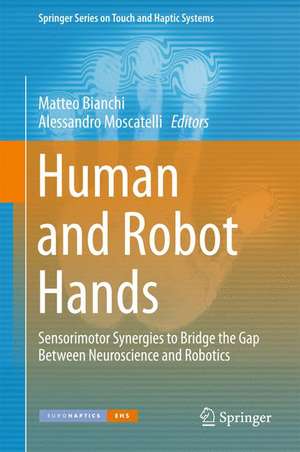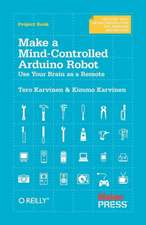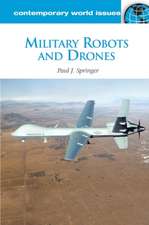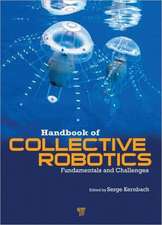Human and Robot Hands: Sensorimotor Synergies to Bridge the Gap Between Neuroscience and Robotics: Springer Series on Touch and Haptic Systems
Editat de Matteo Bianchi, Alessandro Moscatellien Limba Engleză Hardback – 3 mar 2016
Presented in two parts, the first part, Neuroscience, provides the theoretical and experimental foundations to describe the synergistic organization of the human hand. The second part, Robotics, Models and Sensing Tools, exploits the framework of hand synergies to better control and design robotic hands and haptic/sensing systems/tools, using a reduced number of control inputs/sensors, with the goal of pushing their effectiveness close to the natural one.
Human and Robot Hands provides a valuable reference for students, researchers and designers who are interested in the study and design of the artificial hand.
| Toate formatele și edițiile | Preț | Express |
|---|---|---|
| Paperback (1) | 632.40 lei 43-57 zile | |
| Springer International Publishing – 7 apr 2018 | 632.40 lei 43-57 zile | |
| Hardback (1) | 638.56 lei 43-57 zile | |
| Springer International Publishing – 3 mar 2016 | 638.56 lei 43-57 zile |
Din seria Springer Series on Touch and Haptic Systems
- 20%
 Preț: 629.65 lei
Preț: 629.65 lei - 20%
 Preț: 630.47 lei
Preț: 630.47 lei - 20%
 Preț: 302.30 lei
Preț: 302.30 lei - 20%
 Preț: 919.05 lei
Preț: 919.05 lei - 20%
 Preț: 675.87 lei
Preț: 675.87 lei - 20%
 Preț: 629.52 lei
Preț: 629.52 lei - 20%
 Preț: 584.91 lei
Preț: 584.91 lei - 20%
 Preț: 631.29 lei
Preț: 631.29 lei - 20%
 Preț: 625.45 lei
Preț: 625.45 lei - 20%
 Preț: 631.29 lei
Preț: 631.29 lei - 20%
 Preț: 631.93 lei
Preț: 631.93 lei - 20%
 Preț: 331.37 lei
Preț: 331.37 lei - 20%
 Preț: 330.73 lei
Preț: 330.73 lei - 20%
 Preț: 325.56 lei
Preț: 325.56 lei - 20%
 Preț: 591.66 lei
Preț: 591.66 lei - 20%
 Preț: 360.21 lei
Preț: 360.21 lei - 20%
 Preț: 576.49 lei
Preț: 576.49 lei - 20%
 Preț: 707.46 lei
Preț: 707.46 lei - 20%
 Preț: 1014.20 lei
Preț: 1014.20 lei - 20%
 Preț: 904.45 lei
Preț: 904.45 lei
Preț: 638.56 lei
Preț vechi: 798.20 lei
-20% Nou
Puncte Express: 958
Preț estimativ în valută:
122.21€ • 126.94$ • 101.51£
122.21€ • 126.94$ • 101.51£
Carte tipărită la comandă
Livrare economică 03-17 februarie 25
Preluare comenzi: 021 569.72.76
Specificații
ISBN-13: 9783319267050
ISBN-10: 3319267051
Pagini: 283
Ilustrații: XI, 283 p. 97 illus., 31 illus. in color.
Dimensiuni: 155 x 235 x 18 mm
Greutate: 0.59 kg
Ediția:1st ed. 2016
Editura: Springer International Publishing
Colecția Springer
Seria Springer Series on Touch and Haptic Systems
Locul publicării:Cham, Switzerland
ISBN-10: 3319267051
Pagini: 283
Ilustrații: XI, 283 p. 97 illus., 31 illus. in color.
Dimensiuni: 155 x 235 x 18 mm
Greutate: 0.59 kg
Ediția:1st ed. 2016
Editura: Springer International Publishing
Colecția Springer
Seria Springer Series on Touch and Haptic Systems
Locul publicării:Cham, Switzerland
Public țintă
ResearchCuprins
Introduction.- Part I: Neuroscience.- Dexterous Manipulation: From High-level Representation to Low-level Co-ordination of Digit Force and Position.- Digit Position and Force Synergies During Unconstrained Grasping.- The Motor Control of Hand Movements in the Human Brain: Toward the Definition of a Cortical Representation of Postural Synergies.- Synergy Control in Subcortical Circuitry: Insights from Neurophysiology.- Neuronal "Op-Amps" Implement Adaptive control in Biology and Robotics.- Sensorimotor Synergies:Fusion of Cutaneous Touch and Proprioception in the Perceived Hand Kinematics.- Part II: Robotics, Models and Sensing Tools.- From Soft to Adaptive Synergies:The PISA/IIT Softhand.- A Learn by Demonstration Approach for Closed-loop Robust Anthromorphic Grasp Planning.- Teleimpudance Control: Overview and Application.- Incremental Learning of Muscle Synergies:From Calibrating a Prothesis to Interacting with it.- How to Map Human Hand Synergies onto Robotic Hands Using the Syngrasp Matlab Toolbox.- Quasi-static Analysis of Synergistically Underactuated Robotic Hands in Grasp and Manipulation Tasks.- A simple Model of the Hand for the Analysis of Object Exploration.- Synergy-based Optimal Sensing Techniques for Hand Pose Reconstruction
Recenzii
“Neuroscience deals with the controlling of senses in humans and their function in the day-to-day work of the human body. In parallel, the robotics field is developing artificial senses or their capabilities in robots. This book discusses human and robot hands. … This book is an interesting read for researchers, doctoral students, and professionals working in the area of neuroscience and robotics.” (Lalit Saxena, Computing Reviews, March, 2017)
Textul de pe ultima copertă
This book looks at the common problems both human and robotic hands encounter when controlling the large number of joints, actuators and sensors required to efficiently perform motor tasks such as object exploration, manipulation and grasping. The authors adopt an integrated approach to explore the control of the hand based on sensorimotor synergies that can be applied in both neuroscience and robotics. Hand synergies are based on goal-directed, combined muscle and kinematic activation leading to a reduction of the dimensionality of the motor and sensory space, presenting a highly effective solution for the fast and simplified design of artificial systems.
Presented in two parts, the first part, Neuroscience, provides the theoretical and experimental foundations to describe the synergistic organization of the human hand. The second part, Robotics, Models and Sensing Tools, exploits the framework of hand synergies to better control and design robotic hands and haptic/sensing systems/tools, using a reduced number of control inputs/sensors, with the goal of pushing their effectiveness close to the natural one.
Human and Robot Hands provides a valuable reference for students, researchers and designers who are interested in the study and design of the artificial hand.
Presented in two parts, the first part, Neuroscience, provides the theoretical and experimental foundations to describe the synergistic organization of the human hand. The second part, Robotics, Models and Sensing Tools, exploits the framework of hand synergies to better control and design robotic hands and haptic/sensing systems/tools, using a reduced number of control inputs/sensors, with the goal of pushing their effectiveness close to the natural one.
Human and Robot Hands provides a valuable reference for students, researchers and designers who are interested in the study and design of the artificial hand.
Caracteristici
Presents an integrated approach between neuroscience and robotics to understand the complex issue of sensorimotor control of the hand Enriches the understanding of synergies as a framework for an efficient control of multi-element motor systems and for the analysis of hand motion and grasping Provides useful tools for the effective design of artificial hands for the analysis of hand motion and grasping Includes supplementary material: sn.pub/extras











